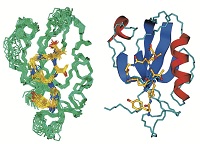 |
| The binding of the compound CN2097 (yellow) to the synaptic protein PSD-95 restores healthy neural function in mice with Angelman syndrome.--Courtesy of Marshall Lab/Brown University |
Researchers at Brown University have concocted a compound that could restore neural functions in children with the rare genetic disorder Angelman syndrome and potentially lead to therapies for other diseases that affect learning and memory.
The disorder, which affects an estimated one in 12,000 to 20,000 people and has no current treatment, causes delayed development, intellectual disability, severe speech impairment, and problems with movement and balance. Most people also have seizures.
The researchers, led by John Marshall, professor of medical science in the university's department of molecular pharmacology, physiology, and biotechnology, have uncovered a signaling breakdown in Angelman syndrome that could provide clues to treat the disorder. They found that the syndrome occurs when an individual has a mutation or deletion in a specific gene, Ube3A. In a normal person, this gene regulates the amount of protein called Arc in the brain. In a person with Angelman syndrome, unchecked Arc levels hinder the growth of synapses in the hippocampus and interfere with the synaptic protein PSD-95, which is essential to a growth factor known as brain-derived neurotrophic factor, or BDNF.
"This growth factor is released in the learning process, and for some reason it doesn't work properly in Angelman syndrome," Marshall explained to FierceBiotechResearch.
Researchers took brain slices from the hippocampus of mice with Angelman syndrome and noted defects in long-term potentiation, or LTP, essentially a strengthening of synapses between nerve cells. LTP is believed to be linked to learning. They found that a synthesized, peptide-like compound called CN2097 injected into brain slices of mice's hippocampus protected PSD-95 from Arc and restored BDNF signaling and synapse formation. The research was published in PLoS Biology.
Marshall said the growth factor BDNF has also been associated with other disorders like schizophrenia, austim spectrum disorders and Rett syndrome, a neurodevelopmental disorder of the grey matter of the brain.
"I'm hoping that Big Pharma will see that this compound that we're working on will not just simply benefit people with Angelman syndrome. It might be potentially useful in treating other diseases," he said.
Marshall did note some shortcomings of the compound though. For one, the half-life is not as long as the researchers would like it to be. He also said the compound in its current form would probably not survive in the GI tract as an oral medication, so it would need to be injected.
- read the press release